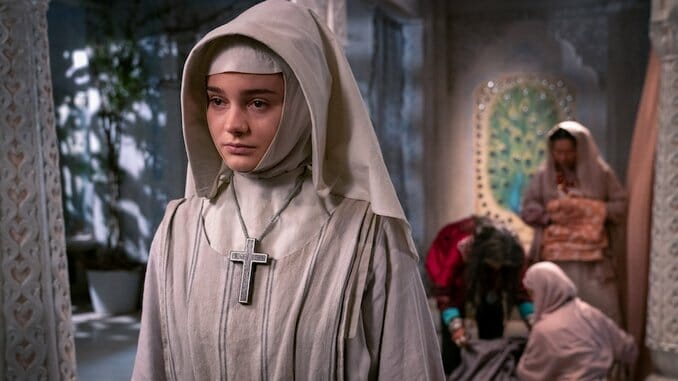Black Narcissus: A Quietly Engrossing Tale of Missionaries and Madness
Photos Courtesy of FX
As many of us have learned the hard way, this year-ish of lockdown has forced some perspective. Spending more hours with oneself or in the close company of a household without the relief of possible escape has led some to clean up and reorganize inside and out. Though affecting everyone differently, the pandemic has managed to unify us in one way, at least: a communal sense of strangeness.
The same uncanny tension permeates Black Narcissus, a taught three-hour miniseries on FX (and Hulu the following day) based on Rumor Godden’s 1939 novel. In it, several members of an order of Anglican nuns stationed in Darjeeling, India, make their way up into the Himalayans to Rajput to start a school. Invited by the royal General, they are picking up where a recent order of German monks gave up, having left under mysterious circumstances.
Taking place at the twilight of the British Raj, the deeply atmospheric Black Narcissus could have easily made for a third season of The Terror. Like that anthology’s first season in particular, we find a group of English subjects striking out into the unknown, ultimately trapped in a place they do not understand. And yet, what ultimately leads to their downfall is not the place itself, or its perceived monsters, but what they learn about themselves.
The miniseries, written by Amanda Coe and directed by Charlotte Bruus Christensen, mixes the intoxication of nostalgia and hope with the dread of falling prey to it. It begins with a violent act that sets the stage for a ghost that haunts the nuns—one in particular—but these manifestations mostly come in the form of various desires. The former palace for concubines is extraordinarily remote, sitting high upon a mountain, with its bell tower overlooking a fertile valley from an extraordinary height. But it is not sterile; the colorful walls also feature erotic paintings, and despite the sisters’ best efforts to get rid of building’s many mirrors, they are mesmerized when they do catch a glimpse of themselves, having been deprived of anything so vain in decades. It is the first of many cracks in their resolve.
At the heart of the story is Sister Clodagh (an outstanding Gemma Arterton), one of the youngest members to ever reach the status of Sister Superior. She is cautioned by the Mother Superior, Dorothea (Diana Rigg, in one of her final roles), to mind her pride. But all of the sisters—Ruth (Aisling Franciosi), Briony (Rosie Cavaliero), Blanche (Patsy Ferran ), Philippa (Karen Bryson), and latecomer Adela (Gina McKee)—struggle with the move to Rajput and its effects on them and their faith. Simple breezes blowing through open windows evoke memories of romance; the place is just too wild, too beautiful. Like the bold “Black Narcissus” scent that the General’s nephew wears when he comes to the school for his lessons, the palace’s temptations begin to overtake the sisters in subtle, quiet, hinted-upon ways. The series has many things in common with the spooky, dreamy, classic Australian film Picnic at Hanging Rock, where an innocent encounter with an ancient, wild place leads to the disappearance of several school teachers and students. Were they taken, or did they run away? Did they perish, or were they set free?